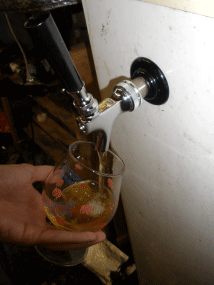Hoppy Beers, Soft Water & A Batch of Brown Ale

I brewed a Sierra Nevada Pale Ale clone on the 3rd of August (I will post a side by side comparison in a few days). It has only now reached the stage where it is drinkable, and is rather a nice pint. Let me restate that: it is an excellent beer, however the hop aroma and flavour has faded slightly. Before now, the beer had a very harsh, mouth filling astringency, that I am attributing to hop tannins. Am I just drinking ‘green’ beer before it is mature? Perhaps, but I’m convinced that my water chemistry, and in particular my boil pH, has something to do with it. The water here is practically distilled, with Calcium under 30 mg/L and other ions even less. I don’t have a figure for the Bicarbonate level but I would be surprised if it were much over 10 mg/L, and certainly no more than 20. To get to the bottom of this I have ordered an alkalinity testing kit. I should add, that most beers turn out very well with my water, wheat beers and lagers in particular turn out magnificent. Dark beers and hoppy beers, not so great.

Taking a suggestion from Chris (the JBK forum brewing sensei), I cut my brewing liquor with some high bicarbonate spring water (2L in a 23L batch) to see if I the hop character is less harsh in the resulting beer. Todays brew was a brown ale with Glacier hops. I see it as halfway between an English and American brown, with the yeast character of the former and the robust malt and hop character of the latter. The recipe is here. It is the first time i’ve used the White Labs British Ale yeast and also Glacier hops, so i’m excited to see what they bring to the party. Below you can see a brief clip of the sparge in process.




